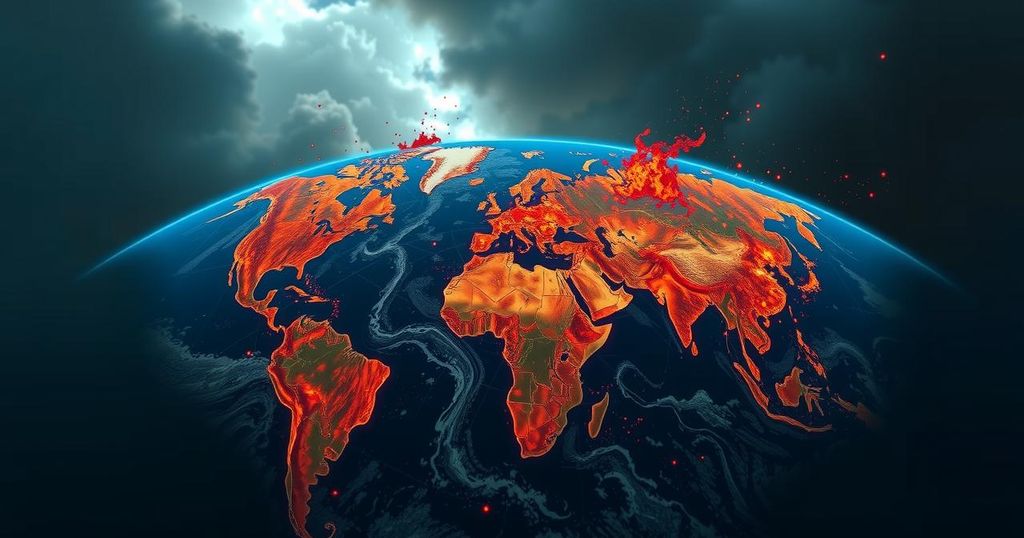Scientists, including Associate Professor Thomas Newsome from the University of Sydney, caution that the Earth faces an unprecedented climate crisis, with a potential warming of 2.7 degrees Celsius by 2100—far exceeding the 1.5 degrees target of the Paris Agreement. The ‘2024 State of the Climate Report’ warns of severe implications if governments fail to act decisively, amidst rising fossil fuel consumption and environmental degradation linked to livestock grazing and deforestation.
An international consortium of scientists, led by Associate Professor Thomas Newsome from the University of Sydney, has issued an urgent warning regarding the state of the planet as it faces unprecedented environmental changes, marking a critical juncture in the ongoing climate crisis. The recently released ‘2024 State of the Climate Report: Perilous times on planet Earth’, published in the journal Bioscience, indicates that current global policies are projected to facilitate a peak warming of 2.7 degrees Celsius by the year 2100, significantly exceeding the 1.5 degrees Celsius limit set forth in the Paris Agreement. As the inaugural Global Nature Positive Summit convenes in Sydney from October 8 to 10, and with the looming UN Climate Change Conference (COP 29) scheduled for November 11 to 22 in Baku, Azerbaijan, the report cautions of dire outcomes without immediate and effective action. Associate Professor Newsome remarked on the yearly records of temperature rises and extreme weather incidents that disproportionately affect vulnerable communities with minimal contributions to climate change, emphasizing the pressing need for decisive government action as these international forums approach. Despite knowledge of human-induced greenhouse gas emissions driving climate change, fossil fuel consumption is on the rise, reflecting a 1.5 percent increase in 2023. Although there have been positive advancements in renewable energy sources, which saw a 15 percent increase in solar and wind consumption this year, these sources still represent only one-fourteenth of total fossil fuel consumption. Moreover, factors such as livestock grazing and deforestation have intensified, with a notable increase in annual tree cover losses—from 22.8 million hectares in 2022 to 28.3 million in 2023. Alarmingly, the existing livestock population continues to grow, with 170,000 added each day, contributing to deforestation to accommodate agricultural expansion. Professor William Ripple, co-lead author from Oregon State University College of Forestry, stated that the integrity of life on Earth is increasingly compromised, asserting, “A large portion of the very fabric of life on our planet is imperilled. We’re already in the midst of abrupt climate upheaval, which jeopardises life on Earth like nothing humans have ever seen.” The report calls for urgent commitments from governments to curtail climate change impacts, advocating for a transition from fossil fuels to low-carbon renewable energy, restoration of biodiverse ecosystems essential for carbon management, implementation of sustainable economic practices, and reduction of excessive consumption among affluent populations. Dr. Christopher Wolf, joint lead author from the Terrestrial Ecosystems Research Network, noted, “Despite six reports from the International Panel on Climate Change, the world has made very little headway on climate change. Humanity’s future depends on creativity, moral fibre and perseverance. If future generations are to inherit the world they deserve, decisive action is needed, and fast.
The article addresses the escalating climate emergency as delineated in the ‘2024 State of the Climate Report’, which highlights alarming statistics and projections regarding global temperature increases and environmental degradation. It reflects a consensus among scientists that humanity is not only at the precipice of climate disaster but also currently facing unprecedented challenges that threaten the ecological balance essential for life on Earth. The report coincides with significant international climate conferences, suggesting a critical period of potential policy shifts and the vital importance of government accountability.
In conclusion, the warnings articulated by the international scientific community underscore the necessity for immediate and substantial action to mitigate irreversible climate change. As current trends indicate an alarming trajectory of warming and environmental degradation, collective efforts during upcoming international summits could define the future of global climate policy. Urgent transformation toward sustainable practices, fostering renewable energy, and addressing both economic and ecological disparities appears pivotal to ensuring a viable future for subsequent generations.
Original Source: www.connectedtoindia.com






